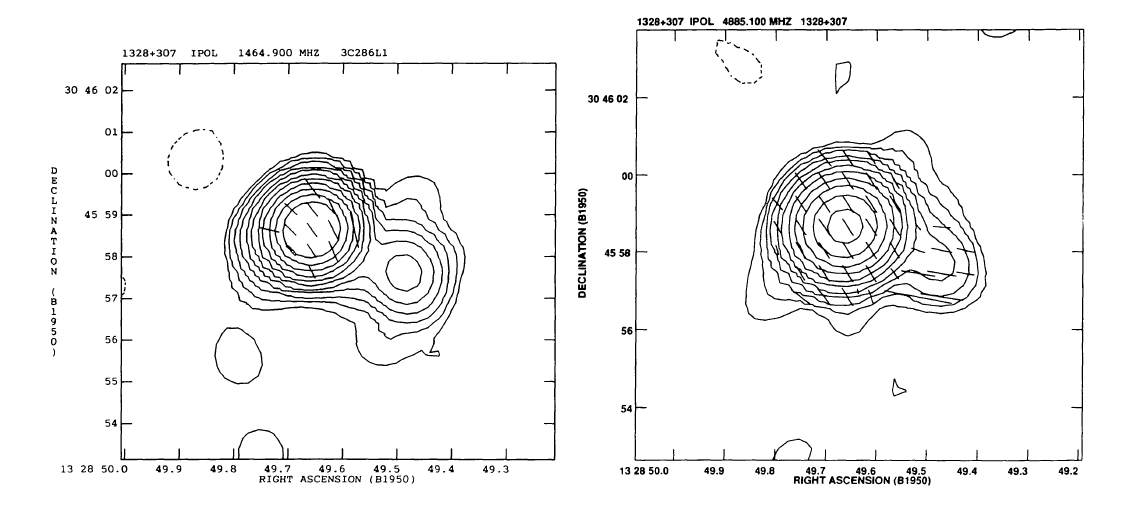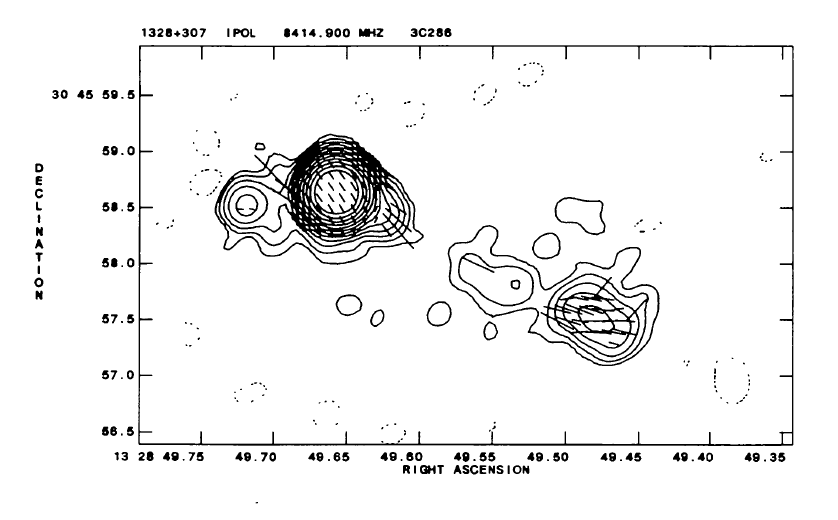3C286 Polarization: Difference between revisions
No edit summary |
|||
| Line 52: | Line 52: | ||
|} | |} | ||
Interferometric polarization data of 3C286 have also been taken using CARMA in 2014 and are reported by Hull & Plambeck 2015 in [https://www.mmarray.org/memos/carma_memo64.pdf CARMA Memo 64]. The polarization position angle reported for 3C286 is 39.2 ± 1° at 1 mm. | Interferometric polarization data of 3C286 have also been taken using CARMA in 2014 and are reported by [http://arxiv.org/abs/1506.04771 Hull & Plambeck 2015 (JAI)] and in [https://www.mmarray.org/memos/carma_memo64.pdf CARMA Memo 64]. The polarization position angle reported for 3C286 is 39.2 ± 1° at 1 mm. | ||
The results obtained from the ALMA SV observations in band 6 will be compared with these available measurements. | The results obtained from the ALMA SV observations in band 6 will be compared with these available measurements. | ||
Revision as of 15:43, 17 June 2015
This page is currently under construction.
DO NOT USE IT.
To navigate the CASAguides pages, visit [http://casaguides.nrao.edu/ casaguides.nrao.edu ]
Science Target Overview
<figure id="1.4_4.8maps">

</figure>
<figure id="8.4map">

</figure>
These observations have been taken with the aim of testing ALMA polarization capabilities.
The target observed is 3C286: a bright, compact, steep-spectrum radio quasar at a redshift of 0.849 (e.g. Hewett & Wild et al. 2010). Radio imaging with the Very Large Array (VLA) at subarcsecond resolution has revealed an extended structure composed of three misaligned bright features. The linear polarization emission is dominated by the two brightest features (see <xr id="1.4_4.8maps" /> and <xr id="8.4map" /> ), and the electric vector position angle is oriented nearly parallel to the axis of the jet like structure between them (Akujor & Garringon 1995). This source has been widely used as calibrator at centimeter radio wavelengths both for total intensity and linear polarization observations. Recently Agudo et al. (2012) presented the results of millimeter measurements with the IRAM 30 m Telescope; they suggest that 3C286 can be used as a new calibrator for both single-dish and interferometric polarization observations at 3mm and possibly at shorter wavelengths. Their observations at 1 and 3 mm produced the following results:
| 1 mm | 3 mm | |
| S (Jy) | 0.30 ± 0.03 | 0.91 ± 0.02 |
| P (%) | 14.4 ± 1.8 | 13.5 ± 0.3 |
| χ (deg) | 33.1 ± 5.7 | 37.3 ± 0.8 |
Interferometric polarization data of 3C286 have also been taken using CARMA in 2014 and are reported by Hull & Plambeck 2015 (JAI) and in CARMA Memo 64. The polarization position angle reported for 3C286 is 39.2 ± 1° at 1 mm.
The results obtained from the ALMA SV observations in band 6 will be compared with these available measurements.
ALMA Data Overview
The ALMA Science verification observations on 3C286 in Band 6, were taken in three different datasets (or 1 session) on July 1st, 2014. All four cross correlations (XX, XY, YX, and YY) measurements were observed using a spectral setup with four 2 GHz spectral windows of 64 channels each (TDM mode with 31.25 MHz resolution per channel). To calibrate the instrumental polarization, we sampled a polarized source (J1337-1257) as a function of paralactic angle every 30 minutes for 5 minutes per sample. The strongly polarized source 3C279 was also observed as a bandpass calibrator; however, it can also be used to check the instrumental polarization calibration.
Obtaining the Data
TO BE UPDATED
To download the data, click on the region closest to your location:
Here you will find three gzipped tar files which, after unpacking, will create three directories:
- 3C286_Band6_pol_UnCalibratedMS - Here we provide you with "starter" datasets, where we have taken the raw data in ALMA Science Data Model (ASDM) format and converted them to CASA Measurement Sets (MS). We did this using the importasdm task in CASA.
- 3C286_Band6_pol_ReferenceImages - The final total intensity and polarization images
To see which files you will need, read on below. The downloads to your local computer will take some time, so you may wish to begin them now.
NOTE: CASA 4.3 or later is required to follow this guide. For more information on obtaining the latest version of CASA, see http://casa.nrao.edu.
3C286 Polarization Data Reduction Tutorial
The casaguide for reducing these data using CASA version 4.3 has been split into calibration and imaging pages:
1) 3C286_Band6Pol_Calibration_for_CASA_4.3
2) 3C286_Band6Pol_Imaging_for_CASA_4.3
You will need to run both scripts in order to get the final images and polarization results. The data needed are available in the directory 3C286_Band6_pol_UnCalibratedMS
NOTE: CASA 4.3 is required to process the data using the guides above see http://casa.nrao.edu/casa_obtaining.shtml.
NOTE: These guides are dynamic and will evolve as our understanding of how best to reduce ALMA data improves. Check back for updates periodically.
How to use this casaguide
For both portions of the guide, we will provide you with the full CASA commands needed to carry out each step.
# In CASA
The commands you need to execute
will be displayed in regions
like this.
Simply copy and paste the commands into your CASA terminal. You may also type the commands in by hand if desired, but be mindful of typos. Note that you may need to hit Enter twice in order for the process to start running. Also note that copying and pasting multiple commands at a time may not work, so only copy and paste the contents of one region at a time.
To learn how to extract the CASA commands into an executable python script, click here.
Occasionally we will also show output to the CASA logger:
This output will be displayed in regions like this.
For a brief introduction to the different ways CASA can be run, click here. For further help getting started with CASA, click here.